Written by: Darryl W. Thomas, Jr.
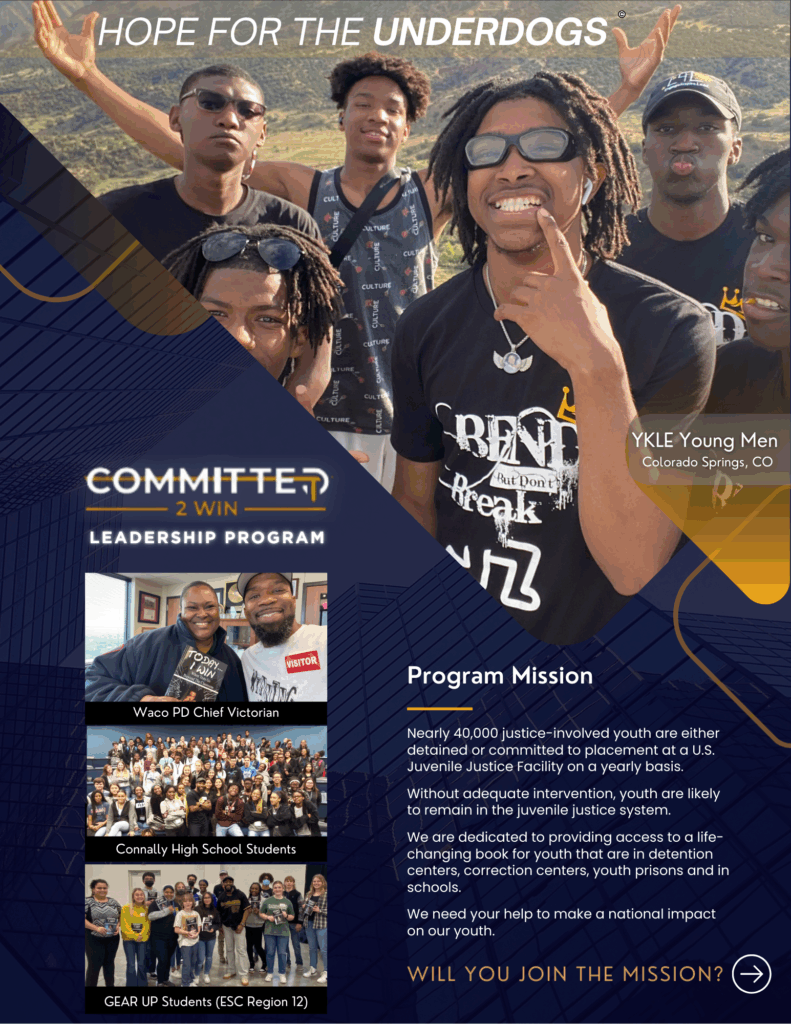
In the heart of Texas, a transformative movement is taking root—Hope for the Underdogs, a summer initiative by Committed 2 Win. This program is more than a seasonal project; it’s a lifeline for justice-involved youth, aiming to break the cycles of illiteracy and recidivism that have long plagued our communities.
The Literacy-Recidivism Link
In my journey working with justice-involved youth, I’ve witnessed firsthand how the inability to read proficiently can limit a young person’s potential and contribute to a cycle of incarceration. It’s a harsh reality: over 70% of inmates in America’s prisons cannot read above a fourth-grade level. Moreover, 85% of juveniles who interact with the juvenile court system are functionally illiterate.
In Texas, the situation is equally concerning. The juvenile recidivism rate stands at 46.7%, meaning nearly half of all juvenile offenders are arrested again within three years. These statistics aren’t just numbers; they represent real lives affected by a lack of access to education and resources. They underscore the urgent need for interventions that address literacy as a foundational skill for rehabilitation and reintegration.Through initiatives like Hope for the Underdogs, we’re striving to change this narrative by providing young people with the tools they need to succeed, both inside and outside the classroom.
Our Mission: Literacy as Liberation
Hope for the Underdogs is committed to reversing these trends by equipping detained youth with the tools they need to succeed. Central to our initiative are three powerful books:
- TODAY… I WIN: When Tests Go Beyond the Classroom
- TODAY WE WIN: How Real Students Found the Answers to Life’s Test (Volumes 1 and 2)
These Amazon bestsellers are not just reading materials; they are catalysts for change, offering relatable narratives that inspire and empower.
Statewide Impact
This summer, our initiative will reach across Texas, bringing our literacy and leadership programs to juvenile detention centers, schools, and community organizations. By focusing on reading comprehension, critical thinking, and personal development, we aim to reduce recidivism rates and foster a new generation of leaders.
Join the MovementWe invite educators, community leaders, and concerned citizens to support our mission. Here’s how you can get involved:
- Partner with Us: Collaborate to bring our programs to your local institutions.
- Sponsor Books: Provide resources for detained juveniles across the state of Texas.
- Spread the Word: Share our mission with your networks to raise awareness.
Together, we can rewrite the narratives of countless young Texans, turning stories of struggle into tales of triumph.For more information, visit www.committed2win.com/hopefortheunderdogs.
Note: The statistics and references provided are based on available data and aim to highlight the importance of addressing literacy in efforts to reduce juvenile recidivism.
Darryl W. Thomas, Jr. is a U.S. Marine Corps veteran, leadership development expert, award-winning speaker, five-time bestselling author, and at-risk interventionist with over two decades of experience. He is the CEO of Committed 2 Win, a personal and leadership development community focused on inspiring, challenging, and empowering young people and adults to overcome adversity and take ownership in becoming the best version of themselves. Beyond his professional achievements, Darryl is a devoted family man, married to his high school sweetheart for 24 years and father to five children: a U.S. Marine, a TCU graduate, a University High School graduate, and two University High scholar-athletes.
By Jeremy Davis
Mentor Waco is a collaboration of like-minded individuals coming together to guide and further enhance the young minds of Waco, Texas, and the surrounding areas. I founded Mentor Waco with the vision of providing guidance, motivation, support and a role model for students while also assisting with academic achievement.
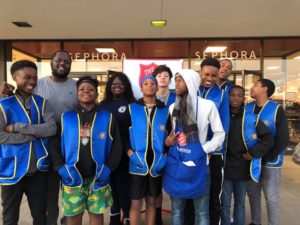
I was inspired to start Mentor Waco after reviewing the academic reports for the Waco area and seeing how poorly young boys were performing compared to their peers. After continued research I felt compelled to help bring about a positive change.
Mentor Waco is geared toward building each individual boy’s character whether it’s academically through tutoring or book club; professionally, through “We can do both” public speaking/research assignments; socially by creating a brotherhood within Mentor Waco, or a combination of all three.
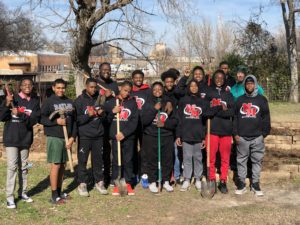
In February of 2018, I started out with seven young men. After working with them academically and socially, they began to show growth very quickly. After experiencing this success, I decided to fully launch Mentor Waco. It is open to 6th through 12th grade students who attend school in or around Waco. Despite being a fairly new organization, Mentor Waco has already made an impact within the area by volunteering for numerous events. We partnered with Mission Waco and “The Hanger” to assist with constructing a garden for the local homeless community. We donated and gathered goods, and then sorted donations at the drop off location for Food for Families. Last year at Christmas we volunteered at Brookdale Lakeshore Senior Living Community. The boys helped set up a Christmas party for the residents and their families. They assisted residents to their seats and served dinner.
Students participating in Mentor Waco have already shown an increase in academic achievement and improved behavior at school. As the program continues to grow, the foundation and core principles will remain the same — to have a positive impact on the students as they prepare for a successful future.
This year Mentor Waco will participate in a new program which we hope will quickly become a tradition. It’s called “We can do both.” The idea for “We can do both” came about because of a lesson with the students on how they should conduct themselves appropriately in different situations. The title “We can do both” is meant to get across the idea that Mentor Waco students should always look their best whether they’re in casual settings or professional settings. I wanted to teach them how to dress and act appropriately in professional settings. I wanted them to be equipped with the knowledge and tools needed to be versatile and to conduct themselves well in any situation. That idea grew into an event and “We can do both” day was born. The primary purpose of this event is to build confidence, expose the students to the world of professional development and dress, and to introduce the critical skills needed for speaking in a professional setting.

During the whole school day, on February 20, 2019, the students of Mentor Waco will dress in business professional attire. Throughout the day, students will be asked preselected questions by Tennyson Middle School faculty and staff. This will give the students a chance to practice appropriately introducing themselves in a mock professional setting.
After the school day is completed, the professional etiquette portion of the event will begin. The students will share a meal during which they will receive training on proper etiquette such as setting the table, selecting the appropriate silverware for the various dishes, and acceptable table manners. The speaker for the event will be Waco police Officer Stan Mason.
We invite you to learn more about Mentor Waco. If you are interested in becoming a mentor, donating professional attire or making a donation please send us an email or click the donation box on our website and on our social media sites:
- Website: https://mentorwaco.weebly.com.
- Facebook: https://www.facebook.com/mentorwaco/
- Instagram: @mentorwaco

Jeremy Davis is the founder of Mentor Waco. He is the son of a preacher which is where he learned how to serve and make a difference in people’s lives through actions. He has been a mentee in various programs that taught servanthood, etiquette and the importance of character and integrity for young men. He is a 2013 graduate of Midway High School, attended Stephen F. Austin, and pledged to be a member of Alpha Phi Omega National Service Fraternity. He was awarded The Presidential Volunteer Service Award in 2018. He was a part of Black Men For Bernie, one of the largest grassroots organizations during the 2016 presidential election. He taught at Standing Rock Indian Reservation School during the pipeline standoff, and he is currently a Behavioral Specialist Aide at Tennyson Middle School. The word he hopes people would use to describe him is “servant.”
The Act Locally Waco blog publishes posts with a connection to these aspirations for Waco. If you are interested in writing for the Act Locally Waco Blog, please email ashleyt@actlocallywaco.org for more information.
(Gloria Conatser, a student at Waco High, was one of 25 students nationwide selected to present their National History Day documentaries at the Smithsonian National Museum of African American History and Culture at this year’s National History Day event. In today’s blog post she shares a bit about what this opportunity meant to her. — ALW )
“Those who don’t know history are bound to repeat it.” – George Santayana
By Gloria Conatser
I have always bothered my teachers with my questions, and the best of them have humored my curiosity. National History Day has allowed me to pursue the answers to my questions myself. In the past six years since I began creating documentaries, every question that I have been able to answer has uncovered ten more for me to follow. Every year, this year especially, my products have been about revealing the events that shaped today.
A big recurring theme in every corner of history is the presence of conflict, and this year’s National History Day theme, “Conflict and Compromise” could be interpreted in many ways.
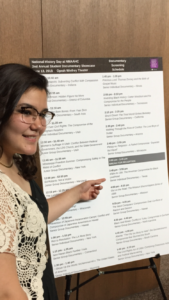 The approach that I chose to take was one that highlights the dark angle of compromise. Merriam-Webster describes it as, “a concession to something derogatory or prejudicial.” The title of my documentary this year is “3/5ths to Thirteenth: The American Compromise of Black Livelihood.” As I explored the 3/5ths Compromise and Thirteenth Amendment, and outlined their modern implications, I learned that the livelihood of Black Americans has been compromised throughout our history by people who don’t have to face the consequences.
The approach that I chose to take was one that highlights the dark angle of compromise. Merriam-Webster describes it as, “a concession to something derogatory or prejudicial.” The title of my documentary this year is “3/5ths to Thirteenth: The American Compromise of Black Livelihood.” As I explored the 3/5ths Compromise and Thirteenth Amendment, and outlined their modern implications, I learned that the livelihood of Black Americans has been compromised throughout our history by people who don’t have to face the consequences.
National History Day has given me the opportunity to exercise mental muscles in a way that is not a standard in the public education system. I have had the freedom to analyze hidden histories, create a product that reflects my research, and hold my own among academic leaders from the local to the national level.
 During the week of National History Day, I had the opportunity to present my documentary at the new Smithsonian National Museum of African American History and Culture. A few days before flying to Washington D.C. I was notified that my work had been selected. The day after National History Day judging I was featured in the Smithsonian and offered an experience that I never would have been able to dream of.
During the week of National History Day, I had the opportunity to present my documentary at the new Smithsonian National Museum of African American History and Culture. A few days before flying to Washington D.C. I was notified that my work had been selected. The day after National History Day judging I was featured in the Smithsonian and offered an experience that I never would have been able to dream of.
 The ultimate takeaway from these years as a National History Day student has been experience: experiencing perspectives that I would otherwise be blind to, experiencing locations many can only dream of, and experiencing the fulfillment of earning these opportunities myself. Practically speaking, I am as capable as most people, and vice versa, but the difference is that I am aware of my abilities and the potential for impact that I have, and that has made all the difference.
The ultimate takeaway from these years as a National History Day student has been experience: experiencing perspectives that I would otherwise be blind to, experiencing locations many can only dream of, and experiencing the fulfillment of earning these opportunities myself. Practically speaking, I am as capable as most people, and vice versa, but the difference is that I am aware of my abilities and the potential for impact that I have, and that has made all the difference.
 Gloria Conatser is a rising senior at Waco High. This is her fifth Year competing at National History Day. Gloria hopes to study engineering or biology and ultimately become an Astronaut. She also aspires to help create a more equal future through her career.
Gloria Conatser is a rising senior at Waco High. This is her fifth Year competing at National History Day. Gloria hopes to study engineering or biology and ultimately become an Astronaut. She also aspires to help create a more equal future through her career.
The Act Locally Waco blog publishes posts with a connection to these aspirations for Waco. If you are interested in writing for the Act Locally Waco Blog, please email ashleyt@actlocallywaco.org for more information.
By Ashley Bean Thornton
Is there anything in this world more hopeful and full of promise than brand new school supplies? The smell of a new box of colors. A brand new sharp pencil full of letters and words and pictures and numbers waiting to be set free. A bright, clean spiral notebook ready to be filled with ideas, and dreams, and problems, and scribbles about who “hearts” who “4-evah,” and drawings of houses and families and fast cars and rockets and dinosaurs. To all the grown-ups out there…if you have forgotten the joy and power of school supplies, you have forgotten a precious thing.
A few months ago, the Act Locally Waco book group decided to read and discuss the book “Other People’s Children: Cultural Conflict in the Classroom” by Lisa Delpit. We had heard through the grapevine that our (then new) WISD school superintendent, Dr. Marcus Nelson, had recommended it to principals in the district, so we put it on our list. On a whim, I decided to invite him to our book discussion, and lo and behold, he came! We had a thought-provoking conversation about heavy issues affecting our schools…and more to the point…our children. I will confess I left the discussion feeling overwhelmed with the complexity and magnitude of the challenges before us.
In the course of the conversation, Dr. Nelson mentioned a poem about a child and a pencil that he thought made an important point…
‘Cause I Ain’t got a Pencil
By Joshua T. Dickerson (reprinted with permission from the author)*
I woke myself up
Because we ain’t got an alarm clock
Dug in the dirty clothes basket,
Cause ain’t nobody washed my uniform
Brushed my hair and teeth in the dark,
Cause the lights ain’t on
Even got my baby sister ready,
Cause my mama wasn’t home.
Got us both to school on time,
To eat us a good breakfast.
Then when I got to class the teacher fussed
Cause I ain’t got a pencil.
This poem is a prism. When you look into it one way all you see is poverty. It can leave you feeling sad and overwhelmed. When you look at it another way you see a bright, capable kid solving problems and figuring out what it takes to keep on keeping on. She (or he) is exasperated with the rest of us because we can’t see that if we would just help her out a tiny bit with a pencil she could get on with the business of getting an education.
Ramona Curtis who works in the Department of External Affairs at Baylor starts each school year by joining the NAACP to welcome and cheer on the young scholars at J. H. Hines Elementary on the first day of school. For a few years now, she has noticed that even with the many, many wonderful school supply drives throughout our community there were still too many kids coming to school without supplies. Several conversations with the principal and outreach coordinator at Hines confirmed that school supplies are a big issue. Even when kids have enough in August, they often run out long before the school year is over. I’m sure teachers do fuss at kids who don’t have pencils – I know I did when I was a teacher! – but teachers also routinely dig into their own pockets to provide supplies for their kids. There never seems to be enough to make it to the end of the school year.
With all this in mind, this year Ms. Curtis is working through the Solid Gold Neighbor Initiative at Baylor along with numerous organizations throughout the community to organize a school supply “power” drive. The goal of this project is to make sure that the five Transformation Zone schools (Brook Avenue Elementary, J. H. Hines Elementary, Alta Vista Elementary, Indian Spring Middle School and G. W. Carver Middle School) who already have so much on their plates this year, do not have to worry about school supplies.
Ms. Curtis and her team visited with the principals at each of the five schools to make a list of the supplies needed for the whole school for the whole year. They got back numbers like 996 boxes of crayons, 2500 glue sticks, 12000 pencils, etc.
Now they are working through churches, sororities and fraternities, non-profits, local businesses and every other kind of organization they can think of to gather those supplies and deliver them directly to the schools to be divvied up among the teachers and distributed as needed with discretion and discernment throughout the school year.
The Solid Gold Neighbor program has made it easy for you to participate. You can donate money directly by clicking on www.baylor.edu/SGNschoolsupplies or by texting BUSGN to 41444. Follow the Solid Gold Neighbor Facebook page for updates about how to donate school supplies and what supplies are still needed. Or contact Ramona Curtis at ramona_curtis@baylor.edu to see how your business or organization can join in!
Not all problems can be solved with a pencil. But sometimes a pencil – or a box of markers, or some paper, or a glue stick — makes a big difference. We have bright, capable kids in Waco ISD. Many of them face tough situations every day and yet resiliently get to school anyway and go about the work of learning the best they know how to do. We have some significant challenges in our schools, and it will not doubt take time to chip away at most of them, but one thing we can do right now is to make sure there’s a pencil available when a kid needs one. Let’s do that!
* You can follow Joshua T. Dickerson on his Facebook page, “Joshua T. Dickerson Speaks,” or on Twitter: @joshtdickerson
 This Act Locally Waco blog post is by Ashley Bean Thornton, she has lived in Waco almost 20 years now. Far longer than she ever lived anywhere else. She likes to walk. If you see her out walking, honk and wave and say, “Hi!”
This Act Locally Waco blog post is by Ashley Bean Thornton, she has lived in Waco almost 20 years now. Far longer than she ever lived anywhere else. She likes to walk. If you see her out walking, honk and wave and say, “Hi!”
The Act Locally Waco blog publishes posts with a connection to these aspirations for Waco. If you are interested in writing for the Act Locally Waco Blog, please email ashleyt@actlocallywaco.org for more information.
By Robin Wilson, Ph.D.
I wasn’t sure what I was getting into when I decided to retire from being a campus principal to return to school to complete my doctorate. I have always loved to learn, and I knew I was ready to embark on a new journey…even though I was a little late in life to be pursuing a Ph.D. While pursuing this degree, I ended up focusing on how to better educate our local high school seniors, teachers, and administrators on what it takes to be college and career ready. There are personal skills, such as time management, study skills, self-awareness, and persistence, required. There are also academic classes, such as dual credit courses or AP (Advanced Placement) courses, that will help prepare a student for college or a career. But, in 2018, the Texas Education Agency (TEA) added a new term and a new standard of expectation for graduating seniors: CCMR.
What is CCMR?
To better meet the expectations of the 60x30TX, TEA expects all seniors, beginning with the class of 2018, to be College, Career, or Military Ready (CCMR). Each graduating student must meet at least one of the following to be considered CCMR:
College Ready
- Earn at least a score of 3 on any Advanced Placement exam or at least a score of 4 on any International Baccalaureate examination
- Meet Texas Success Initiative (TSI) minimum score requirements in reading and mathematics*
- Complete a dual credit course/courses (earning at least 3 hours in English or Mathematics OR at least 9 hours in any subject)
Career Ready
- Earn an industry-based certification
- Complete a Career/Technical Education (CTE) course aligned with an approved industry-based certification
- Graduate with a completed Individualized Education Program (IEP) and workforce readiness (for certain students served through special education programs)
Military Ready
- Enlist in the United States Armed Forces (Army, Navy, Air Force, Coast Guard, or Marines).
While TEA gives students a variety of ways in which to meet the CCMR, many of these methods will not be known to students (like the TSI or available industry-based certifications/CTE courses aligned to certifications) nor will it be known to students that they should report to their schools if whether they enlist in the US Armed Forces. Therefore, everyone needs to be more familiar with this new requirement.
What is TSI?
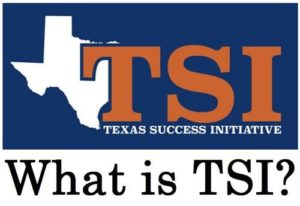 The TSI (Texas Success Initiative) is the placement test used by colleges and universities to help determine if your child is ready for college-level courses. Although your child can be “admitted” to a higher education institution based on his or her ACT or SAT scores, “placement” in college-level coursework will depend on his or her TSI scores. If your child does not meet the standards or exemptions below, he or she will be enrolled in a developmental education program designed to help him/her become college ready. These developmental courses do not count for college credit, but your child will still have to pay the cost of enrolling in these college-level courses.
The TSI (Texas Success Initiative) is the placement test used by colleges and universities to help determine if your child is ready for college-level courses. Although your child can be “admitted” to a higher education institution based on his or her ACT or SAT scores, “placement” in college-level coursework will depend on his or her TSI scores. If your child does not meet the standards or exemptions below, he or she will be enrolled in a developmental education program designed to help him/her become college ready. These developmental courses do not count for college credit, but your child will still have to pay the cost of enrolling in these college-level courses.
Minimum scores on TSI to be considered-college ready:
- Mathematics: 350
- Reading: 351
- Writing: a placement score of at least 340, and an essay score of at least 4: OR a placement score of less than 340 and an ABE Diagnostic level of at least 4 and an essay score of at least 5.
Exemptions from the TSI Reading/Writing assessment can be earned based on ACT/SAT scores or course completion:
- Score a 23 or higher composite on the ACT and a minimum of 19 on the English section
- Score 480 or higher on the SAT Evidence-Based Reading and writing section (no composite score needed)
- Receive credit for completing the College Preparatory English course
Exemptions from the TSI Mathematics assessment can be earned based on ACT/SAT scores or course completion:
- Score a 23 or higher composite on the ACT and a minimum of 19 on the Mathematics section
- Score 530 or higher on the SAT Mathematics section (no combined score needed)
- Receive credit for completing the College Preparatory Mathematics course
What do these new standards mean for our school districts?
These new standards change the expectations for graduating seniors and how our high schools will receive their “A-F grade” from TEA (https://tea.texas.gov/A-F). The elementary and middle school campuses’ grades from TEA will still be based on STAAR test scores (100%), but high schools will now be graded on STAAR scores (40%), CCMR rate (40%), and graduation rate (20%). This new accountability for high schools will take the work of a village to ensure that all of our seniors graduate ready to pursue a degree at a higher education institution or move into the work force career-ready.
How can parents help make sure their child is college and career ready?
Parents can help in numerous ways:
- Encouraging your child to not only take dual credit or Advanced Placement courses but also perform well in those courses and on their exams;
- Reminding your child to take his or her opportunities to take the TSI seriously and to study any practice materials available for the TSI;
- Aiding your child in finding opportunities to earn an industry-based certificate (if their goal is to be career-ready) through participation in CTE courses, the Greater Waco Advanced Manufacturing Academy or the Greater Waco Advanced Health Care Academy;
- Urging your child to utilize the college planning guide.
Your local high schools also need you to help educate your neighbors about CCMR. The new standards can be conquered, and our high schools can continue to provide our students with skills and knowledge necessary to be successful, but it will take the work of a village. Help spread the word in our community on what it takes to be college, career, or military ready!
 Dr. Robin Wilson is the College Readiness Coordinator and AVID District Director for Waco Independent School District. She earned her Masters degree from University of Texas at Tyler and her Doctorate at Baylor University. She has worked as a classroom teacher, campus principal, a district administrator, an AVID professional development staff member, and a university adjunct professor.
Dr. Robin Wilson is the College Readiness Coordinator and AVID District Director for Waco Independent School District. She earned her Masters degree from University of Texas at Tyler and her Doctorate at Baylor University. She has worked as a classroom teacher, campus principal, a district administrator, an AVID professional development staff member, and a university adjunct professor.
The Act Locally Waco blog publishes posts with a connection to these aspirations for Waco. If you are interested in writing for the Act Locally Waco Blog, please email ashleyt@actlocallywaco.org for more information.
By Larry Carpenter
“‘Cause a little bit of summer is what the whole year is all about’.” These lyrics from pop singer John Mayer’s song, “Wildfire,” ignite a spark of anxiousness as the end of the school year inches closer and the summer months draw near—especially for students who have worked hard in the classroom all school year long reading, writing, testing, and growing their minds and bodies.
As a student, I remember so vividly how the looming summer vacation from school would bring opportunities to be outdoors, attend summer camps, go to the swimming pool, or even just mow the lawn and smell the fresh cut grass. The length of the sunny days would unfold and give rise to something new and challenging everyday. And when the Texas heat grew too hot to be outdoors for long periods of time, it was important to have activities indoors to keep me occupied and engaged.
 That is where the Hawthorne Youth Center came into play for me. The HYC was a very small, community-based summer activity center in my old hometown. Owned by a local family, giving back to local kids was priority number one. Just a three-quarter mile bike ride from my front door, the HYC provided creative, athletic, educational, and social activities and events for youth of all ages. It was there that I not only learned the value of being part of a team, but I learned the value of social interaction, developing confidence to start conversations with others I didn’t already know. I enjoyed those summers at the HYC, and I was so very thankful that my school let the group promote their summer camp so that my family had the opportunity to let me go and grow.
That is where the Hawthorne Youth Center came into play for me. The HYC was a very small, community-based summer activity center in my old hometown. Owned by a local family, giving back to local kids was priority number one. Just a three-quarter mile bike ride from my front door, the HYC provided creative, athletic, educational, and social activities and events for youth of all ages. It was there that I not only learned the value of being part of a team, but I learned the value of social interaction, developing confidence to start conversations with others I didn’t already know. I enjoyed those summers at the HYC, and I was so very thankful that my school let the group promote their summer camp so that my family had the opportunity to let me go and grow.
It’s not very different for kids today. As we move closer to the close of the 2018 school year, students and their parents will be looking for activities to occupy their time in creative, fun, and educational ways.
In an effort to highlight many of the amazing opportunities available to families in the Waco area this summer, the Waco ISD Department of Student Services and Family Engagement is sponsoring a Summer Showcase on Saturday, May 5, 2018 at the Mayborn Museum from 9:00 a.m. to Noon.
Organizations, clubs, companies, and non-profits, among others will be sharing information about summer camps, student-centered activities, and other summer happenings at the Showcase. Whether you are looking for artistic outlets, growing a garden, developing leadership opportunities or just finding a way to keep cool in the summer heat—the Summer Showcase is the place to explore all your options. Many of the events and offerings are free or low-cost, and the Summer Showcase is a perfect time to find out what’s going on in our community this summer.
At the Cinco de Mayo themed event, families will enjoy food catered from George’s Restaurant, get free prizes from the various organizations represented, be entertained by a variety of activities and performances, and most importantly, get information on summer activities for youth of all ages.
The event is open to all of the Waco area community. It is never too early to see what’s happening in the community to help you make the most informed plans for the summer.
As the hard work of another school year comes to an end, it reminds me so fondly of my summers at the Hawthorne Youth Center and what a difference those experiences had in my life.
Waco ISD hopes to share some of those exciting opportunities to the community through the Summer Showcase! So, we hope to see you on May 5 at the Mayborn Museum from 9:00 to Noon!
Happy Summer everyone!
 Larry Carpenter is the Director of Fine Arts for Waco ISD. Having been with WISD for 18 of his 24 years in education, he has served WISD as a teacher, assistant principal, principal, assistant director of Advanced Academics and now Director of Fine Arts.
Larry Carpenter is the Director of Fine Arts for Waco ISD. Having been with WISD for 18 of his 24 years in education, he has served WISD as a teacher, assistant principal, principal, assistant director of Advanced Academics and now Director of Fine Arts.
By Aranza Torres and Jon Singletary
With a commitment to inspiring, guiding, and connecting young leaders in Waco ISD, Superintendent Marcus Nelson introduced the first Empowerment Summits for Young Men and Young Women. Campus staff and administrators identified approximately 450 students in grades seven through 12 as future leaders from seven Waco ISD campuses.
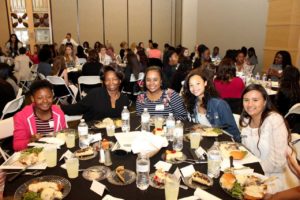 Students had the opportunity to hear from local experts in the medical, legal and educational fields on topics ranging from managing stress, social media, sexual violence, college access and leadership development during panel-style discussions. At the Women’s Empowerment Summit, Jolanda Jones, a Houston ISD trustee, former city council member, author, attorney and former All-American athlete and member of the United States track and field team, served as the keynote speaker. Jones was also a former contestant on “Survivor” and star of WEtv’s “Sisters in Law.”
Students had the opportunity to hear from local experts in the medical, legal and educational fields on topics ranging from managing stress, social media, sexual violence, college access and leadership development during panel-style discussions. At the Women’s Empowerment Summit, Jolanda Jones, a Houston ISD trustee, former city council member, author, attorney and former All-American athlete and member of the United States track and field team, served as the keynote speaker. Jones was also a former contestant on “Survivor” and star of WEtv’s “Sisters in Law.”
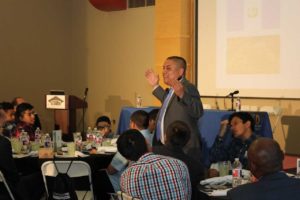 Jaime Carias, the keynote speaker for the men, is the Civic Engagement Coordinator at the University of Southern California Annenberg School for Communication and Journalism. Carias is also a leading urban educator, author and national speaker who is well known for his ability to inspire and educate students of all ages.
Jaime Carias, the keynote speaker for the men, is the Civic Engagement Coordinator at the University of Southern California Annenberg School for Communication and Journalism. Carias is also a leading urban educator, author and national speaker who is well known for his ability to inspire and educate students of all ages.
Approximately 75 men and women from the Central Texas area representing various professions and community organizations volunteered as table hosts to provide a strong leadership presence and facilitate conversations with the attendees. The following reflections are from two of our table hosts. – Robin McDurham, Assistant Superintendent of Student Services & Family Engagement
Empowerment Summit for Young Women
 As a college recruiter, I have the privilege of walking students and families through the transition from high school to college. Occasionally I am given the opportunity to participate in community events such as the Waco ISD Young Women’s Empowerment Summit on February 23rd. As a table host, I had the pleasure of meeting 8 wonderful young leaders who were hand-selected by their campuses to participate in the summit. Our table included students from different campuses and of varying grade levels. It was great to witness them get to know one another, share related experiences and provide advice and encouragement. I was thrilled to hear of the many ways these bright young women demonstrate their leadership through school clubs, dual credit classes, athletics and additional community opportunities.
As a college recruiter, I have the privilege of walking students and families through the transition from high school to college. Occasionally I am given the opportunity to participate in community events such as the Waco ISD Young Women’s Empowerment Summit on February 23rd. As a table host, I had the pleasure of meeting 8 wonderful young leaders who were hand-selected by their campuses to participate in the summit. Our table included students from different campuses and of varying grade levels. It was great to witness them get to know one another, share related experiences and provide advice and encouragement. I was thrilled to hear of the many ways these bright young women demonstrate their leadership through school clubs, dual credit classes, athletics and additional community opportunities.
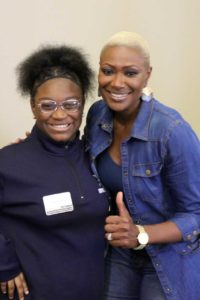 I enjoyed the time I spent with my group and gained new insights thanks to the excellent speakers. The panelists covered a number of relevant topics including; social media, sexual violence and consent, college readiness, stress management and personal development. They were able to offer concrete advice and action steps students could take now. One of my personal highlights of the morning was the keynote speaker, Jolanda Jones, whose powerful and resilient life experiences are a testament to the power of hard work and the importance of finding confidence in one’s self. I feel very lucky to have been invited to the summit and have shared this time with my group.
I enjoyed the time I spent with my group and gained new insights thanks to the excellent speakers. The panelists covered a number of relevant topics including; social media, sexual violence and consent, college readiness, stress management and personal development. They were able to offer concrete advice and action steps students could take now. One of my personal highlights of the morning was the keynote speaker, Jolanda Jones, whose powerful and resilient life experiences are a testament to the power of hard work and the importance of finding confidence in one’s self. I feel very lucky to have been invited to the summit and have shared this time with my group.
 Young leaders are one of the best elements of our school campuses. Recognizing them in our community and investing in them is imperative. Ensuring that they feel supported and heard will serve to encourage their growth. We will look to these young leaders as they move to their next grade level, the college of their choice and contribute to our community. No matter where these young women end up I am confident that they will be hard-working and successful. – Aranza Torres
Young leaders are one of the best elements of our school campuses. Recognizing them in our community and investing in them is imperative. Ensuring that they feel supported and heard will serve to encourage their growth. We will look to these young leaders as they move to their next grade level, the college of their choice and contribute to our community. No matter where these young women end up I am confident that they will be hard-working and successful. – Aranza Torres
Empowerment Summit for Young Men
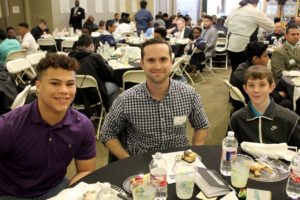 A few weeks ago, I had the opportunity to join a few local leaders on a panel as part of Dr. Marcus Nelson’s inaugural Young Men’s Empowerment Summit. Some eyes may have been on us, the panelists, but our eyes were on the amazing gathering of men in the room that day. Not only did three dozen men from Central Texas, representing a wide range of professions from accounting and law to medicine and ministry, come together in
A few weeks ago, I had the opportunity to join a few local leaders on a panel as part of Dr. Marcus Nelson’s inaugural Young Men’s Empowerment Summit. Some eyes may have been on us, the panelists, but our eyes were on the amazing gathering of men in the room that day. Not only did three dozen men from Central Texas, representing a wide range of professions from accounting and law to medicine and ministry, come together in  support of men’s empowerment, but more importantly were the 200 young men from Waco ISD schools who gathered. As those of us on the panel looked out on that room, we noticed the pride and confidence of the men, and the potential and hope that they represent. Too few young men in today’s culture are invited to reflect on the value of their past and even fewer have a clear expression of hope for their future. On that day, I saw that perspective shift in dozens of middle and high school men. As the panel reflected on social challenges from technology to sexuality, and as our guest speaker, Jaime Carias, shared his own journey of struggle and hope, these young men laughed, their eyes lit up, and they looked ahead at what their lives might hold. And, if this event is a glimpse of the future that Waco has with the leadership of these youth and the leadership of Dr. Nelson, then our future together is bright indeed. – Jon Singletary
support of men’s empowerment, but more importantly were the 200 young men from Waco ISD schools who gathered. As those of us on the panel looked out on that room, we noticed the pride and confidence of the men, and the potential and hope that they represent. Too few young men in today’s culture are invited to reflect on the value of their past and even fewer have a clear expression of hope for their future. On that day, I saw that perspective shift in dozens of middle and high school men. As the panel reflected on social challenges from technology to sexuality, and as our guest speaker, Jaime Carias, shared his own journey of struggle and hope, these young men laughed, their eyes lit up, and they looked ahead at what their lives might hold. And, if this event is a glimpse of the future that Waco has with the leadership of these youth and the leadership of Dr. Nelson, then our future together is bright indeed. – Jon Singletary
 Aranza Torres has lived in Waco for a majority of her life (21 years!). She is a University High School graduate who continued her education out of state at Goshen College located in Goshen, IN. After graduating with a Bachelor of Social Work she returned to Waco to give back to her local community. She is currently a Recruiter and Dual Credit Advisor at McLennan Community College. In her spare time she enjoys being a part of the Waco Immigrants Alliance, Advisor to the MCC Hispanic Student Association, doing puzzles and spending time with her two large pitbull puppies (they’re not really puppies).
Aranza Torres has lived in Waco for a majority of her life (21 years!). She is a University High School graduate who continued her education out of state at Goshen College located in Goshen, IN. After graduating with a Bachelor of Social Work she returned to Waco to give back to her local community. She is currently a Recruiter and Dual Credit Advisor at McLennan Community College. In her spare time she enjoys being a part of the Waco Immigrants Alliance, Advisor to the MCC Hispanic Student Association, doing puzzles and spending time with her two large pitbull puppies (they’re not really puppies).
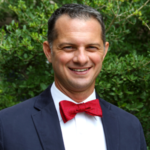 Jon Singletary, PhD, MSW, MDiv, is dean and professor of the Diana R. Garland School of Social Work at Baylor University. He has served on faculty at Baylor since 2003. His wife teaches at Hillcrest PDS in Waco ISD and their children attend the Atlas Academy at Tennyson Middle School and Waco High School.
Jon Singletary, PhD, MSW, MDiv, is dean and professor of the Diana R. Garland School of Social Work at Baylor University. He has served on faculty at Baylor since 2003. His wife teaches at Hillcrest PDS in Waco ISD and their children attend the Atlas Academy at Tennyson Middle School and Waco High School.
(Para leer este artículo en español, haz clic aquí.)
By Jaime Carias
Over the past decade, I have had the honor and privilege of working with parents across the country from all walks of life. Working with parents at different schools and community centers has impacted my outlook on family engagement. Every experience in my line of work has reinforced my belief in the importance of parent engagement during their children’s K-12 educational journey. The earlier that we work with parents to demonstrate the value that they bring to the educational success of their children, the better chance we have at keeping them engaged.
Parents always ask me, “Mr. Carias who do you like to work with the most? Our children, their teachers, or us parents?” To which I reply, “I enjoy working with everyone.” In order for our children to succeed in and out of the classroom and pursue a college education, all three teams: students, parents, and teachers need to work collaboratively and not against each other. Communication is key towards establishing trust amongst all three teams. Parents continue to ask me, “but if you had to choose one group to work with who would you choose?” When asked that question again (it has happened multiple times) I can’t help but stop and look at the parents asking me this question. The answer is simple: I enjoy working with parents. I am a firm believer that student success begins at home, and I have made it my personal commitment to work with parents across the country to help change the toxic narrative that parents do not care to be involved. For so many years this false narrative has hindered underrepresented communities and students of color by being portrayed as disinterested in education. Instead, educators need to create opportunities for parents to become involved. Most importantly, educators must help parents understand the value that being involved brings to their children’s personal, academic, and professional success.
In our book “Buscando Vida, Encontrando Exito: La Fuerza de La Cultura Latina en la Educacion” (Accomplishing Success: Supporting Our Children with The Power of Culture) we highlight the journey and obstacles parents encounter when discussing educational success, educational goals, college enrollment, and career paths with their children. It’s not unusual for low-income families to fail to understand why their sons or daughters might want to go away for college. Our book is a practical guide meant to help parents understand how to become proactive advocates in their children’s educational journey. The influence of family on a student’s college-going decision is huge. Other times, parents are not involved at all and the student is left on their own to make very difficult decisions. Through our research, we have discovered that parents want their children to succeed in school, yet very few of them fully comprehend the role that they play in helping their children fulfill that vision. In my presentations, I seek to change this narrative. I focus on having parents understand the value of developing growth mindsets to create college-going cultures in their homes. Changing the narrative from a fixed-mindset to a growth-mindset allows parents to understand the value of continuous learning and family engagement. As educators, we have to develop culturally competent programming for parents of color so that they can feel welcome and can actively participate in the K-12 school system.
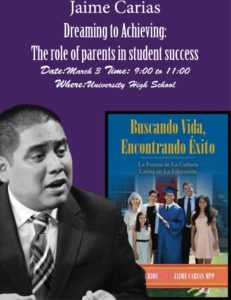 I am very excited to visit Waco ISD for student and parent programming. As a first-generation college student who was born and raised in South Central Los Angeles by Guatemalan parents, I understand the struggle and journey of the students and parents I will be serving this week in WISD. Collectively we will continue to work together to provide the opportunities parents seek for their children. Our children need to thrive and not just survive in the world of the 21st century. We need to remember that it all starts at home, as we move forward and develop student and parent programming. We are all equally invested in the future success of our youth; educators and parents need to collectively work together towards that common goal. I look forward to meeting everyone in the WISD.
I am very excited to visit Waco ISD for student and parent programming. As a first-generation college student who was born and raised in South Central Los Angeles by Guatemalan parents, I understand the struggle and journey of the students and parents I will be serving this week in WISD. Collectively we will continue to work together to provide the opportunities parents seek for their children. Our children need to thrive and not just survive in the world of the 21st century. We need to remember that it all starts at home, as we move forward and develop student and parent programming. We are all equally invested in the future success of our youth; educators and parents need to collectively work together towards that common goal. I look forward to meeting everyone in the WISD.
 Jaime Carias was born and raised in the low-income community of South Central Los Angeles to Guatemalan immigrant parents and has dedicated his entire career to helping young people and parents seek better opportunities in school and in life. Carias has been featured on several national and local media outlets for his work developing educational and community-engaging programs aimed at creating access to higher education and empowering underserved communities across the country like his.
Jaime Carias was born and raised in the low-income community of South Central Los Angeles to Guatemalan immigrant parents and has dedicated his entire career to helping young people and parents seek better opportunities in school and in life. Carias has been featured on several national and local media outlets for his work developing educational and community-engaging programs aimed at creating access to higher education and empowering underserved communities across the country like his.
(To read this post in English, Click here. )
Por Jaime Carias
Durante la última década, he tenido el honor y el privilegio de trabajar con padres por todo el país que vienen de todos los caminos de la vida. Trabajando con los padres en diferentes escuelas y centros comunitarios ha impactado mi perspectiva sobre la participación familiar. Cada experiencia en mi línea de trabajo ha reforzado mi creencia en la importancia de la participación de los padres durante el viaje educativo K-12 de sus hijos. Entre mas pronto trabajemos con los padres para demostrar el valor que aportan al éxito educativo de sus hijos, mas posibilidad tenemos para mantenerlos comprometidos.
Los padres siempre me preguntan, “Sr. Carias, ¿con quién le gusta trabajar más? ¿Con nuestros hijos, con los maestros, o con nosotros los padres?” A lo que les respondo: “Me gusta trabajar con todos.” Para que nuestros hijos tengan éxito dentro y fuera del salón y persigan una educación universitaria, los tres equipos: los estudiantes, los padres y los maestros necesitan que trabajar en colaboración y no uno contra el otro. La comunicación es clave para establecer la confianza entre los tres equipos. Los padres continúan a preguntarme, “Pero si tuvieras que elegir un grupo con quien trabajar, ¿a quién elegirías?” Cuando me preguntan esa pregunta nuevamente (que ha sucedido varias veces) no puedo evitar pararme y mirar a los padres que me están preguntando. La respuesta es simple: me gusta trabajar con los padres. Creo firmemente que el éxito estudiantil comienza en la casa, y me he comprometido personalmente a trabajar con los padres de todo el país para ayudar a cambiar la narrativa tóxica que a los padres no les importa participar en la educación de sus hijos. Durante muchos años, esta narrativa falsa ha obstaculizado a las comunidades de color, al ser retratadas como comunidades desinteresadas en la educación formal. En cambio, los educadores necesitan que crear oportunidades para que los padres participen. Aun más importante, es que los educadores deben de ayudar a los padres comprender el valor que ser involucrados le inculca al éxito personal, académico y profesional de sus hijos.
En nuestro libro “Buscando Vida, Encontrando Éxito: La Fuerza de la Cultura Latina en la Educación”, destacamos el viaje y los obstáculos que enfrentan los padres cuando hablan sobre el éxito educativo, la matriculación universitaria, y las trayectorias profesionales con los hijos. No es inusual que las familias de bajos ingresos no comprendan la razón por la cual los hijos o hijas se salen de la casa para asistir la universidad. Nuestro libro es una guía práctica para ayudar a los padres a entender cómo convertirse en partidarios proactivos en el camino educativo de sus hijos. La influencia de la familia en la decisión de asistir la universidad es enorme para los estudiantes. Otras veces, los padres no participan y el estudiante se queda solo para tomar estas decisiones tan difíciles. A través de nuestras investigaciones, hemos descubierto que los padres quieren que sus hijos tengan éxito en la escuela. Sin embargo, muy pocos de ellos comprenden el papel que juegan en cumplir esta visión con sus hijos. En mis presentaciones, busco cambiar esta narrativa. Me enfoco en convencer a los padres sobre el valor de desarrollar una mentalidad de crecimiento para crear culturas universitarias en sus hogares. Cambiar la narrativa de una mentalidad fija a una mentalidad de crecimiento permite a los padres comprender el valor del aprendizaje continuo y la participación familiar. Como educadores, tenemos que desarrollar una programación culturalmente competente para los padres de color para que se sientan bienvenidos y puedan participar activamente en el sistema escolar K-12.
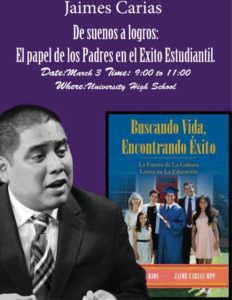 Estoy muy emocionado por mi visita al distrito Waco, donde entregare mi programación para padres y estudiantes. Como estudiante universitario de primera generación que nació y se crió en South Central Los Ángeles por padres de Guatemala, entiendo la lucha y viaje de los estudiantes y los padres que voy a servir esta semana en el distrito Waco. Continuaremos a trabajando juntos para brindar las oportunidades de éxito que los padres buscan para sus hijos. Nuestros hijos necesitan prosperar y no solo sobrevivir en el mundo del siglo 21. Mientras los educadores desarrollan programación para los padres y estudiantes, debemos de acordarnos que todo empieza en la casa. Todos estamos igualmente invertidos en el futuro éxito de nuestra juventud; los educadores y los padres deben de trabajar juntos para alcanzar ese objetivo común. Espero conocer a todos durante mi visita al distrito Waco.
Estoy muy emocionado por mi visita al distrito Waco, donde entregare mi programación para padres y estudiantes. Como estudiante universitario de primera generación que nació y se crió en South Central Los Ángeles por padres de Guatemala, entiendo la lucha y viaje de los estudiantes y los padres que voy a servir esta semana en el distrito Waco. Continuaremos a trabajando juntos para brindar las oportunidades de éxito que los padres buscan para sus hijos. Nuestros hijos necesitan prosperar y no solo sobrevivir en el mundo del siglo 21. Mientras los educadores desarrollan programación para los padres y estudiantes, debemos de acordarnos que todo empieza en la casa. Todos estamos igualmente invertidos en el futuro éxito de nuestra juventud; los educadores y los padres deben de trabajar juntos para alcanzar ese objetivo común. Espero conocer a todos durante mi visita al distrito Waco.
 Jaime Carias nació y fue criado en el Sur Centro de Los Angeles por dos inmigrantes Guatemaltecos. Ha dedicado toda su carrera a ayudar a jóvenes y padres en la búsqueda de mejores oportunidades en la escuela y en la vida. Carias ha aparecido en varios medios de comunicación nacionales y locales por su trabajo en el desarrollo de programas educativos y programas de comunidad que crean acceso a la educación superior y apodera a las comunidades desatendidas en este país.
Jaime Carias nació y fue criado en el Sur Centro de Los Angeles por dos inmigrantes Guatemaltecos. Ha dedicado toda su carrera a ayudar a jóvenes y padres en la búsqueda de mejores oportunidades en la escuela y en la vida. Carias ha aparecido en varios medios de comunicación nacionales y locales por su trabajo en el desarrollo de programas educativos y programas de comunidad que crean acceso a la educación superior y apodera a las comunidades desatendidas en este país.
By Angelo Ochoa
It’s Eight o’clock…. Do you know where your kids are?
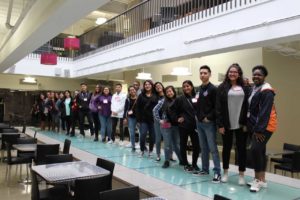 If you were to ask this question to parents of the students in the Academy of Business and Finance at University High School, the answer would be easy. “Yes I do. They are still at school preparing income tax returns for the community.”
If you were to ask this question to parents of the students in the Academy of Business and Finance at University High School, the answer would be easy. “Yes I do. They are still at school preparing income tax returns for the community.”
This year will mark the 14th year for a tax program that a lot of folks in the Waco community have been taking advantage of for years, many since the beginning. But, this is not your average, ordinary, everyday income tax site for two very important reasons.
- All of the services are provided FREE of charge.
- It is run by the students of the Ron E. Smith Academy of Business and Finance at University High School.
So, here is some background….
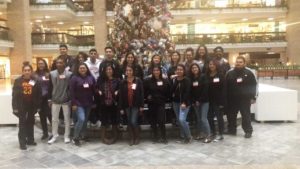 In 2004, Ms. Angela Reiher, then assistant principal at A.J. Moore Academy, and Mr. Ron Smith, a teacher in the school’s Academy of Finance, contacted the IRS about opening up a VITA (Volunteer Income Tax Assistance) Site at the school. The IRS, who provides the tax software and the Site Identification Number for e-filing purposes, offered to help as long as the school could guarantee to prepare at least a hundred returns. The goal of the IRS’s VITA program is to offer free tax help for low to middle income people, persons with disabilities, those who speak limited English, and the elderly. To everyone’s surprise, the students of the Academy of Finance were able to prepare over 300 tax returns the first year! And, what started out as a creative way for students to put into practice what they were learning in the classroom, has only grown larger each year. In fact, in the thirteen years since our doors opened, our students have completed over twenty-two thousand tax returns totaling over thirty-nine million dollars in refunds for the Waco community. What makes this so meaningful is that these, often much needed refunds are directly deposited in local banks and credit unions and are spent right here in the Waco community at local business.
In 2004, Ms. Angela Reiher, then assistant principal at A.J. Moore Academy, and Mr. Ron Smith, a teacher in the school’s Academy of Finance, contacted the IRS about opening up a VITA (Volunteer Income Tax Assistance) Site at the school. The IRS, who provides the tax software and the Site Identification Number for e-filing purposes, offered to help as long as the school could guarantee to prepare at least a hundred returns. The goal of the IRS’s VITA program is to offer free tax help for low to middle income people, persons with disabilities, those who speak limited English, and the elderly. To everyone’s surprise, the students of the Academy of Finance were able to prepare over 300 tax returns the first year! And, what started out as a creative way for students to put into practice what they were learning in the classroom, has only grown larger each year. In fact, in the thirteen years since our doors opened, our students have completed over twenty-two thousand tax returns totaling over thirty-nine million dollars in refunds for the Waco community. What makes this so meaningful is that these, often much needed refunds are directly deposited in local banks and credit unions and are spent right here in the Waco community at local business.
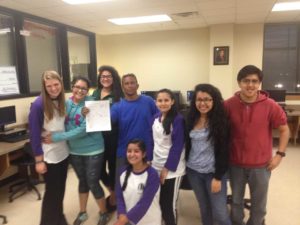 As a teacher, I often try to put myself in the shoes of these students and ask myself if I was the kind of high school kid who would have stayed after school and volunteered until late in the evening preparing taxes for complete strangers. I have never gotten an answer that I liked that wasn’t me lying to myself.
As a teacher, I often try to put myself in the shoes of these students and ask myself if I was the kind of high school kid who would have stayed after school and volunteered until late in the evening preparing taxes for complete strangers. I have never gotten an answer that I liked that wasn’t me lying to myself.
Ruth Rodriguez, a senior, who also volunteers in the Trojan Branch of Educators Credit Union located on the University High School campus has been a part of the tax program since she was a freshman. She has completed over 305 hours of community service and she is the first smile you see when you walk in the door. She says, “My main job here at the tax site is to sign people in and verify identification and social security cards. Probably my favorite part of what I do is getting to meet new people. Most of the people we help are really grateful for the service we provide, and even though I don’t really know them they seem to really want me to do good things with my life. They love to offer advice on what I should and shouldn’t do once I graduate from high school. As a freshman I was afraid to talk to adults, other than teachers or my family, and usually not even them, now I feel confident in answering their questions, explaining their tax returns to them and listening to stories about the struggles of being an adult.”
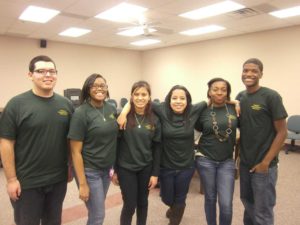 Shelby Reyes, a senior, who also volunteers at the Trojan Branch of Educators Credit Union and who has over 347 volunteer hours, echoed Ruth’s thoughts, but Shelby’s roots in this program run a little bit deeper. “My sister, Jennifer, also did taxes in this program from 2008 to 2012 when it was still A.J. Moore Academy,” she says. “My sister always enjoyed being in business classes and doing taxes and I can see why. The Academy of Business and Finance has really helped me throughout high school to decide what I want to do with my life. Doing taxes has become a passion for me because I just love helping people. I started doing taxes as a 9th grader. I was scared at first because, honestly, who would think a high school freshman could do someone’s taxes and not mess them up. My teachers, Mr. Ochoa and Mrs. Moore, did a good job preparing us and they were always there to help out and the people getting their taxes done are usually really patient. I stayed as often as I could because I love hearing people’s stories about their successes and failures in life…people love to tell their stories. There are always interesting people that come in and you never know what or who each night might bring. Every year there is this man that comes in with big bamboo sticks and tells all of the kids what a great job we are doing and that we’re all ‘lookin’ stylish.’ Before he leaves he always holds up those big sticks and prays over us and the school. I’m going to miss seeing him every year after I graduate.”
Shelby Reyes, a senior, who also volunteers at the Trojan Branch of Educators Credit Union and who has over 347 volunteer hours, echoed Ruth’s thoughts, but Shelby’s roots in this program run a little bit deeper. “My sister, Jennifer, also did taxes in this program from 2008 to 2012 when it was still A.J. Moore Academy,” she says. “My sister always enjoyed being in business classes and doing taxes and I can see why. The Academy of Business and Finance has really helped me throughout high school to decide what I want to do with my life. Doing taxes has become a passion for me because I just love helping people. I started doing taxes as a 9th grader. I was scared at first because, honestly, who would think a high school freshman could do someone’s taxes and not mess them up. My teachers, Mr. Ochoa and Mrs. Moore, did a good job preparing us and they were always there to help out and the people getting their taxes done are usually really patient. I stayed as often as I could because I love hearing people’s stories about their successes and failures in life…people love to tell their stories. There are always interesting people that come in and you never know what or who each night might bring. Every year there is this man that comes in with big bamboo sticks and tells all of the kids what a great job we are doing and that we’re all ‘lookin’ stylish.’ Before he leaves he always holds up those big sticks and prays over us and the school. I’m going to miss seeing him every year after I graduate.”
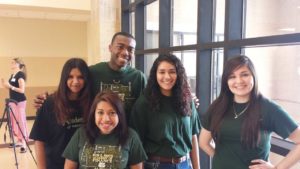 Student opinions about the program all seem to be pretty similar. “I love when people give me advice.” “I love helping out the newer students who might be a little scared.” “I love that people need my help doing something difficult that can impact their lives.” “I’ve learned that people can be very different. Some can be rude and some can be kind and patient and when I grow up I get to decide which of those I want to be.” The one phrase that is typically heard most during tax season is, “What are we eating tonight?” As student volunteers, these kids literally ‘will work for food’. So naturally we have more volunteers on the nights we are eating hot wings than the nights we are having ham sandwiches. We have been very fortunate, in the past, to receive donations from many local restaurants and churches, as well as donations and grants from the community to help feed the kids, but it continues to be a struggle.
Student opinions about the program all seem to be pretty similar. “I love when people give me advice.” “I love helping out the newer students who might be a little scared.” “I love that people need my help doing something difficult that can impact their lives.” “I’ve learned that people can be very different. Some can be rude and some can be kind and patient and when I grow up I get to decide which of those I want to be.” The one phrase that is typically heard most during tax season is, “What are we eating tonight?” As student volunteers, these kids literally ‘will work for food’. So naturally we have more volunteers on the nights we are eating hot wings than the nights we are having ham sandwiches. We have been very fortunate, in the past, to receive donations from many local restaurants and churches, as well as donations and grants from the community to help feed the kids, but it continues to be a struggle.
Before a student can volunteer at a VITA site, even if they are just holding the door or passing out pencils, they are required to be certified through the IRS. This is not an easy task to complete and ultimately, it is up to them to decide if they want to volunteer. It is not a requirement and their grade is not affected by it. For them, the reward is the activity itself. The students know that if they were not here to help, people might have to pay someone for this service. They are at this great place between childhood and adulthood where they have not yet started to become motivated by their own economic self-interests. For the kids in this Academy, we have to remind them that actions always speak louder than words, especially those actions that honor themselves, their families, their school, and their community.
As a teacher, there is nothing more rewarding than seeing a timid freshman, scared of the world, doing their first tax return for a complete stranger grow into a senior, beaming with confidence, and explaining to a customer the difference between standard and itemized deductions.
It is really impossible to describe just how beneficial this is to the students at University High School. From a very young age we place a lot of expectations on students with their only rewards being good grades and an assurance from an adult that, “it’s important to your future.” This doesn’t always work, and in my experience, sometimes rewards can often produce less of the very things we are trying to encourage. I have noticed that, while they are volunteering, the students get to experience something they do not often get every day… gratitude. Overwhelming gratitude from the people they are helping. It is not often a high school student gets to hear, “Thank you, thank you for being here and helping me with this. You have no idea how much this means to us.” Our students get to hear it many times a night.
I am not sure exactly what it is that keeps these students excited about staying and doing taxes in the evenings. Whatever it is, their motivation comes from somewhere deep within. From a part of themselves that has a desire to serve others and finds joy in doing that work. It is not just about athletics and academics. It is about integrity, building good character, and nurturing the hearts and minds of students that want to go out into the world and change it for the better.
If you would like more information about our program, please visit www.uhstaxes.com.
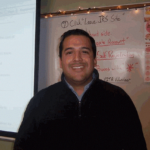 Angelo Ochoa teaches Financial Analysis, Accounting 1, and Income Tax Accounting for the Ron E. Smith Academy of Finance at University High School. He was formally with Central National Bank before taking the opportunity to teach business courses at A.J. Moore Academy. He is in his 8th year with Waco ISD and serves as the Site Coordinator for the school’s Volunteer Income Tax Assistance site.
Angelo Ochoa teaches Financial Analysis, Accounting 1, and Income Tax Accounting for the Ron E. Smith Academy of Finance at University High School. He was formally with Central National Bank before taking the opportunity to teach business courses at A.J. Moore Academy. He is in his 8th year with Waco ISD and serves as the Site Coordinator for the school’s Volunteer Income Tax Assistance site.
